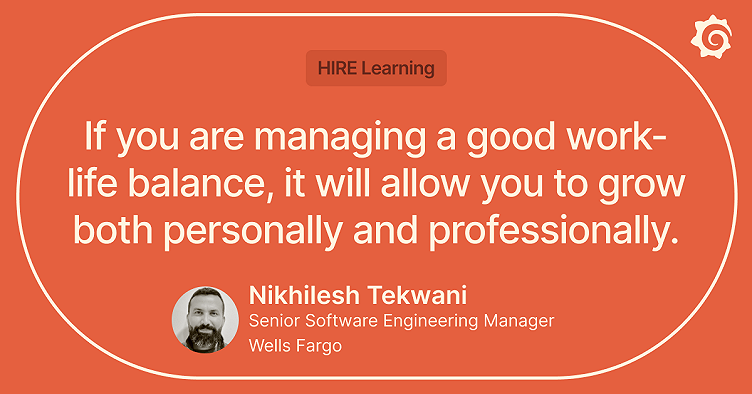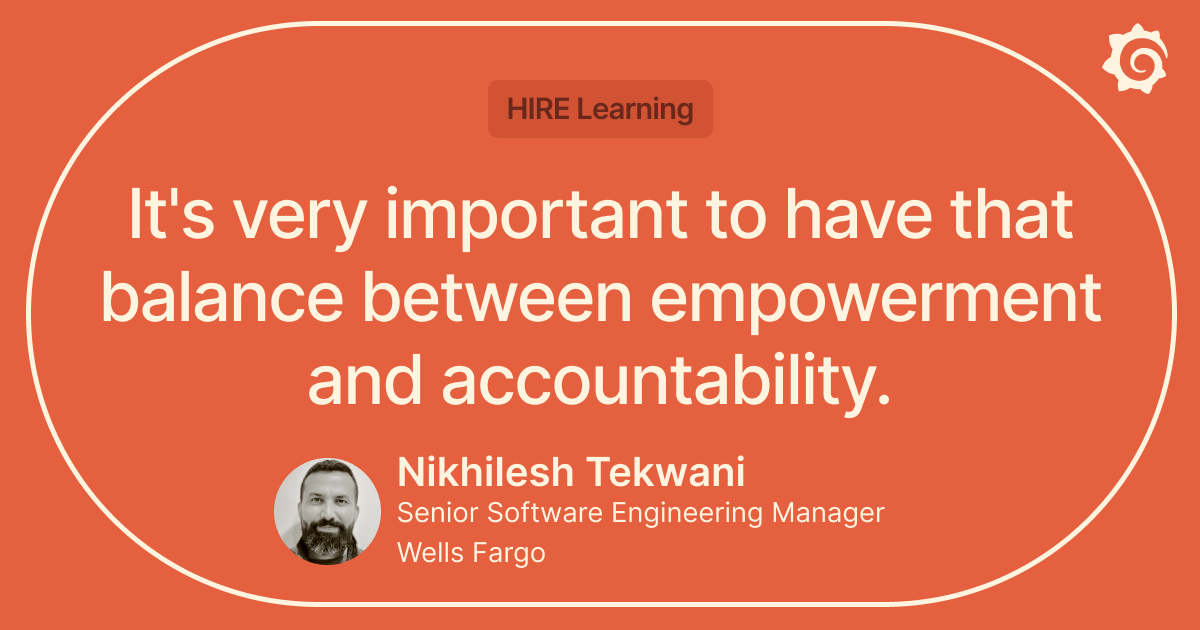
HIRE Learning with Wells Fargo: 'Give everyone an equal voice and let the best idea win'
The HIRE Learning series gets inside the brains of hiring managers who are looking for smart engineers, passionate Grafana users, and observability enthusiasts to join their teams. Find out what questions they ask, what red flags they look for, and what helps their teams succeed.
Nikhilesh Tekwani has places to go. The Senior Software Engineering Manager at Wells Fargo already had his 2023 vacations planned a year in advance — winter break, spring break, and a dream summer vacation to the resort town of Banff, in Alberta, Canada.
And he encourages his globally dispersed engineering and development teams to do the same. “I bring up PTO [paid time off] actively at the one-on-one level, at team meetings, as well as in my monthly and quarterly notes,” says Tekwani. “My philosophy is if you are managing a good work-life balance, it will allow you to grow both personally and professionally.”
While admittedly there are times the workload “upsets the balance,” Tekwani says, “that should not become the normal, because that doesn’t align with our long-term strategy for having high-performing teams.”
Those are the teams that Tekwani has been building and growing for the past year at Wells Fargo as he has led the migration from a legacy monitoring system to a more modern observability strategy rooted in Grafana Cloud and Grafana Enterprise. Supporting everyone from platform and application development teams to product organizations at the 170-year-old bank, “we cover everything end-to-end,” Tekwani explained during his recent ObservabilityCON session, “Wells Fargo’s observability transformation, powered by Grafana Enterprise and Grafana Cloud.” “We provide the data to help all of these teams do what they do and be successful.”
As a manager, Tekwani strives to do the same for his entire observability org, which consists of four teams distributed across the U.S. and India. He makes it a priority to schedule monthly one-on-one meetings, because “it allows me to stay in touch with every team member,” he says. “It’s not just about understanding what the priorities are for the team, but also what the priorities are at the individual level. What are the challenges they’re having? What are the blockers they are facing? And how can I help as a leader to facilitate solutions to those problems so they can excel?”

Taking a best-for-all approach to management, Tekwani divides his time between driving the team towards its goals, pushing the evolution of the observability strategy, or digging into complex problems. (“Hands-on engineering is always first, right?” he says.) But no matter what, he finds every opportunity to listen. “I want to make sure I understand what someone is sharing because I rely on the team’s expertise for our continuous development,” he says. “My approach is to give everyone an equal voice at the table and let the best idea win without prejudice.”
Interested in joining his team or incorporating some of his best practices into your own hiring strategy? In his own words, Tekwani talks more about the open positions on the Wells Fargo observability teams, his management style, his surprising interview ice breaker, and the red flags he looks for in potential candidates.
Open positions at Wells Fargo
Lead Software Engineer R-223467
Lead Software Engineer R-223472
Lead Software Engineer R-223473
How to do well at Wells Fargo. The top quality Tekwani looks for in a new hire? “Someone who is respectful and thoughtful in their work and words — both verbal and written — will really thrive at Wells Fargo,” he says. “At an individual level, it’s our standard to look for hands-on contributors who are also motivated team players willing to collaborate with team members, if needed. They’re strong problem solvers, and they can’t be afraid of speaking their mind freely or asking questions. Overall, they have the ability to get along well with people, even if there are differences.” Within observability engineering, “it is good to be versatile in observability, but even better to be an expert in a niche area, such as metrics, Prometheus, OpenTelemetry, synthetic monitoring, event/alert management, logging, traces, etc.," says Tekwani. He also looks for a team member “who is constantly honing their knowledge and understanding at the ground level as well as at a 30,000 feet view and is considered a trustworthy domain expert or SME among their peers.”
The cold open. Let’s face it: “As engineers, we can do lots of things, but interviews are not always our strength,” says Tekwani. To warm up his job candidates, “I break the ice by asking some very basic questions, like what does the abbreviation CPU stand for? There have been responses that are really incorrect or funny — or both,” says Tekwani, whose favorite answers include cloud platform universe, computer processing unit, and Cassandra, Python, Unix. [For the record, it’s central processing unit.] “The idea is not to test what they know,” he says. “I try my best to make them laugh. I feel like when we’re able to loosen up and relax we get more of their real personality versus the interview turning into a Q&A session.”
Collaboration and communication. “Our team is dispersed across different continents, different countries, different states, different cities,” says Tekwani. “We work in a hybrid manner — 50% in office, 50% remote — so strong communication is one of the things that my teams really focus on.” With the help of Microsoft Teams, which Wells Fargo adopted earlier this year, Tekwani’s observability org has been more efficient in their engineering work, but “I think we can continue to do better to stay connected, regardless if you’re in the office or working from home or in different cities,” Tekwani says. “Collaboration should not be difficult. We have the right tools for it, and I want the team to really advance their use of the technologies we have in place to be successful.”
Checks and balances. “My focus is not just managing the team. My bigger focus is on managing the effectiveness of the team,” says Tekwani. “It’s very important to have that balance between empowerment and accountability. I want to allow the team members to thrive, take risks, fail, learn, and grow — but also be accountable in their approach. Because in the end, we are a financial institution, and we want to manage our risk effectively. Someone who takes risk control and security lightly, that’s a huge red flag for us. But someone who can show that they’re constantly striving to not just improve themselves, but share that expertise with their peers so they’re improving the community they’re part of, that always stands out.”
Wells Fargo & Company is a leading financial services company that has approximately $1.9 trillion in assets, proudly serves one in three U.S. households and more than 10% of small businesses in the U.S., and is a leading middle market banking provider in the U.S. For more information, visit the Wells Fargo website.
Are you a hiring manager looking for observability experts and Grafana enthusiasts? We’d love to highlight your team, your company, and your open observability positions in our HIRE Learning series. Please reach out to us at HIRElearning@grafana.com to learn more.
